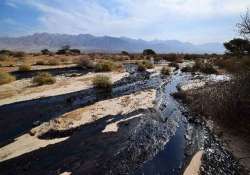UN asks Israel to pay Lebanon USD 850 M for oil spill
United Nations: The U.N. General Assembly overwhelmingly approved a resolution on Friday asking Israel to pay Lebanon over $850 million in damages for an oil spill caused by an Israeli air force attack on oil

United Nations: The U.N. General Assembly overwhelmingly approved a resolution on Friday asking Israel to pay Lebanon over $850 million in damages for an oil spill caused by an Israeli air force attack on oil storage tanks during its war with Hezbollah in July 2006.
The assembly voted 170-6 in favor of the resolution, with three abstentions. Israel, the United States, Canada, Australia, Micronesia and Marshall Islands voted “no.”
General Assembly resolutions are not legally binding but they do reflect world opinion.
The resolution says “the environmental disaster” caused by the destruction of the tanks resulted in an oil slick that covered the entire Lebanese coastline and extended to the Syrian coastline, causing extensive pollution.
Israel's U.N. Mission did not respond immediately to a request for comment.
The assembly acknowledged the conclusions in an August report by Secretary-General Ban Ki-moon that studies show the value of damage to Lebanon amounted to $856.4 million in 2014. It asked Israel to provide “prompt and adequate compensation.”
The assembly also asked Ban to urge U.N. bodies and other organizations involved in the initial assessment to conduct a further study, building on the work conducted by the World Bank, to measure and quantify the environmental damage sustained by neighboring countries.
The resolution notes that “the secretary-general expressed grave concern at the lack of any acknowledgment on the part of the government of Israel of its responsibilities vis-a-vis reparations and compensation” to Lebanon and Syria for the oil spill.
It notes that Ban concluded that the spill is not covered by any international oil spill compensation funds and therefore recognizes “that further consideration needs to be given to the option of security the relevant compensation from the government of Israel.”
Lebanon's U.N. Ambassador Nawaf Salam said his country considers the resolution to be “major progress” because it puts forward a figure for compensation, acknowledges the conclusions of the secretary-general's report, and reaffirms the General Assembly's commitment to justice.
“We affirm that Lebanon will continue to mobilize all resources and resort to all legal means to see that this resolution is fully implemented, and that the specified compensation is paid promptly.”